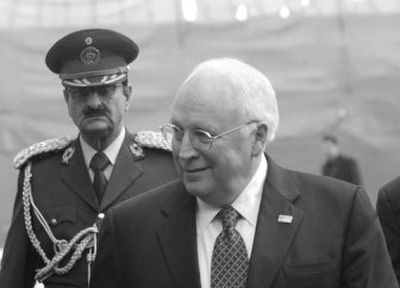Unclear if attacker knew of Cheney visit

WASHINGTON – U.S. and Afghan officials are investigating whether Taliban fighters who claimed responsibility for a suicide bombing at Bagram Air Force Base were tipped off that Vice President Dick Cheney was visiting the U.S. military headquarters.
Cheney, who was staying a mile from where the bomb detonated, was not injured in the attack at the gate of the sprawling base. A U.S. soldier and a South Korean soldier were among those killed. Reports of the overall death toll varied, with the U.S. military saying there were nine dead and the Afghan government putting the number killed at 23 and reporting two dozen injured.
Cheney’s visit to Afghanistan was unannounced. The attack came at a time of growing concern over the resurgent Taliban and the tenuous stability of the U.S.-backed Afghan government. The possibility that insurgents knew details of a secret visit by a top U.S. official and were able to launch an attack would cast the conflict in a troubling new light.
The Taliban claimed responsibility for the attack.
“At this point, it simply isn’t clear that it was known that Cheney was there,” said a U.S. intelligence official, who spoke on condition of anonymity.
U.S. intelligence officials suggested the Taliban would have attempted a more aggressive attack had leaders known in advance that Cheney would be at Bagram.
“If you were in the Taliban’s sandals or shoes, wouldn’t you have used rockets and mortars?” said a second U.S. intelligence official. “If you knew that this thing was happening, that the vice president was going to be there at that time, couldn’t you have just brought up 30 or 40 guys and a truck?”
Cheney told reporters traveling with him that he had heard a “loud boom.” After the explosion, the vice president was briefly moved to a bomb shelter before returning to his quarters and then leaving the base. He said he was not aware of the Taliban’s claim of responsibility but said such attacks were aimed at undermining the Afghan government.
“I think they clearly try to find ways to question the authority of the central government,” Cheney said. “Striking at Bagram with a suicide bomber, I suppose, is one way to do that, but it shouldn’t affect our behavior at all.”
Cheney arrived at Bagram late Monday afternoon after talks in Islamabad, Pakistan, with Pakistani President Pervez Musharraf.
Deputy CIA Director Stephen Kappes accompanied Cheney on the trip to Pakistan to ensure that the vice president “had all the current information” as he pressed Musharraf for greater cooperation in fighting al-Qaida, Director of National Intelligence Michael McConnell said in Senate testimony Tuesday.
Cheney had planned to travel to Kabul for a meeting with Afghan President Hamid Karzai on Monday evening, but bad weather made flying to Kabul too dangerous, so he spent the night at the base and put off the meeting until the next day.
The stops in both Islamabad and Kabul were kept secret beforehand for security reasons, and Cheney made no public statement or appearance in either capital. The suicide bombing occurred as the vice president was preparing for his rescheduled meeting with Karzai.
The first U.S. intelligence official stopped short of saying a formal investigation was under way of possible security breaches. But the officials said U.S. and Afghan reviews were seeking to determine whether someone with access to information about the secret trip told others outside the government.
White House spokesman Tony Snow said there were too few facts to speculate on what might have happened or how attackers were able to get close to the base.
“People are still investigating what happened,” Snow said. “So we don’t have a firm answer for you.”
Still, some experts on Afghanistan cast doubt on the Taliban’s intelligence-collection ability and said it was unlikely to be capable of tracking the movements of someone on the level of Cheney, who was traveling with heavy security.
“I am inclined to think it was a coincidence,” said one congressional staffer who has studied Afghanistan. “Dick Cheney didn’t intend to stay over. And I don’t think the Taliban has the level of human intelligence to know what goes on on an American base.”
But even if the timing of the attack was a fluke, it was telling that Afghanistan insurgents were able to mount an attack on the base, said Derek Chollet, a fellow at the Center for Strategic and International Studies.
“It’s a symbol of a larger trend,” Chollet said. “The insurgency is growing more significant. Most people expect, in at least the short term, it is going to get worse in Afghanistan before it gets better.”